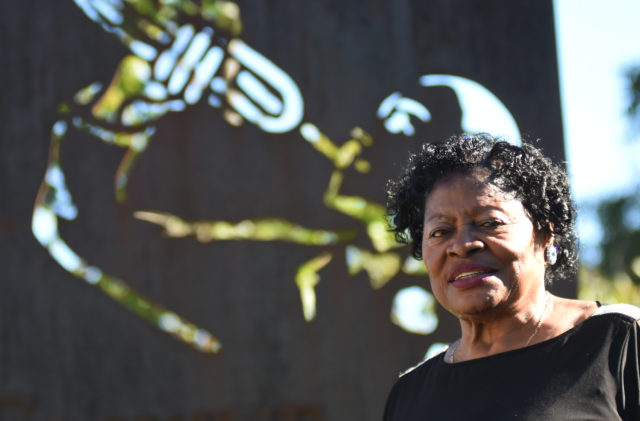
By Ariel Worthy
The Birmingham Times
Welcome to Third Thursdays! This new series—published in the Birmingham Times on the third Thursday of every month—highlights area citizens who overcome odds to make a difference in their own lives or those who make a difference in the lives of others.
If you ask Magnolia Cook her age, she’ll say, “39.”
“People always want to feel sorry for you when you tell them your age,” she said. “They want to try to help you climb the stairs, and they don’t realize they’re hindering you.”
Cook is not one to be hindered, particularly when it comes to her beloved Birmingham. Her work in the community is extensive: She is a former neighborhood association president, co-founder of the annual Function in the Junction jazz festival, a retired nurse, an advocate for schools in Ensley, and a former board member of the Village Creek Society. She also can be seen still working out every morning at her local recreation center.
Function in the Junction
Cook helped establish the annual Function in the Junction jazz festival, one of the Magic City’s most popular community affairs. The event—scheduled for October 20 this year—was founded in 1985 to honor Birmingham native Erskine Hawkins, who penned the jazz standard “Tuxedo Junction,” and it has attracted music legends like the Temptations and the Manhattans to Ensley.
At one time, Ensley was a place few wanted to claim, said Cook, the former Tuxedo Neighborhood Association president. But that changed when James Cotton, an Ensley community resource officer, thought it would be a good idea to highlight important people from Tuxedo.
“He let us know that Erskine Hawkins wrote the song ‘Tuxedo Junction’ and put Birmingham on the map,” said Cook.
Members of the Temptations and the Ensley Jubilees also lived in the area, she added, and the idea was to let people know about the many contributions of local residents and to serve as a reminder of the community’s vibrant history.
“You didn’t have to go to Birmingham for nothing,” Cook said. “We had our own stores, our own everything. When the steel plant left, the stores just closed up and left, so we started Function in the Junction.”
That was 33 years ago.
The Function in the Junction began modestly in a small empty lot on the corner in what is now Erskine Hawkins Park. A couple of years after the first event, Hawkins was invited to play in the field, which is now the park named after him.
“The city came and cut the grass for him to perform and made a stage for him,” Cook said. “In the third year, he came on his own. They paid him to perform. They paid him until he died. He rode in the parade the year he died, 1993.”
From its outset, the day-long festival started with gospel music and ended with the headliners.
“The older people and children came out during the day because the older people wanted to hear the gospel and the children wanted to play,” Cook said. “So, from [noon to 4 p.m.] you would see that crowd. But at night the older people would come back for that headliner.”
Scholarships are also part of the Function in the Junction, and money is given to high schools like Minor High School and P.D. Jackson-Olin High School.
Growing Up in Birmingham
Cook considers herself country-born and city-bred. Born in Pickens County, the youngest of 18 children, Cook was raised in Birmingham. Her family lived in Edgewater after her father began working in the mines.
“My family bought a house in Ensley when I was in sixth grade, and I graduated from [A.H. Parker High School],” she said. “Then I went to college at the Grady Hospital School of Nursing [in Atlanta]. I was dating my husband before I left [for college]. I had known him since elementary school, so when I went off to school he went off to the [U.S.] Army.
“He got out before I did, and we were already engaged when he left. So, when he came back, we got married, and I finished school. When I came home [after completing my studies], he had already bought me a house. We got married in 1956 and moved back to Birmingham that year. My father moved to Chicago, … and I married my husband, so I would stay here.”
Cook worked at Grady Hospital School of Nursing in the 1950s, then she joined the staff at Lloyd Noland Hospital, formerly a steel plant hospital in Fairfield. Cook said she could have worked anywhere, but that was one hospital where blacks didn’t have to go in the basement for medical treatment. She worked at Lloyd Noland until she retired in 1993.
Enhancing the Community
Cook was instrumental in the building of the new Jackson-Olin High School, which opened in 2006 after merging with the former Ensley High School. She helped with both the designing and the naming of the facility.
“[In] the design they had, the back of the school was facing the main street,” Cook said. “I said, ‘That doesn’t help the community. … That makes it look like a jail.’ I got them to turn the front of it to the main road.”
She also insisted on the name.
“I lived right by Ensley High School and couldn’t go there. I had to be bussed to A.H. Parker High School,” Cook said. “Ensley was built for white folks. Jackson-Olin was built for black folks. I said, ‘Since black students are going to be going to J-O, give us the black name.’”
In addition to actively working to enhance the educational facilities in her community, Cook has played a key role in protecting the environment in the area, as well. She is a former board member of the Village Creek Society, an organization that aims to improve the environment to benefit the residents, businesses, and institutions in its watershed. She helped get residents to move out of flood zones.
“Dr. Mable Anderson, [founder of Village Creek Society], would go door-to-door, knocking on people’s doors,” Cook said. “They didn’t know her, though, so I walked side-by-side with her, going to these people’s doors, so they could get up out of the flood areas. We had more than 200 houses down there that we got people out of.”
Feeling Good
Cook also served for nearly 40 years as president of the Tuxedo Junction Neighborhood Association; she retired from the position three years ago, when she moved to Bush Boulevard.
Still an active presence in her beloved Birmingham, Cook is regularly seen out and about in the community. Every morning, she works out at the local recreation center, “unless I have a doctor’s appointment,” she said. “Before my husband got sick, he used to go with me every day.”
Cook said she feels good about all the people she’s been able to help and freely talks about anything—except her age.
“My age is my business,” Cook said.
Third Thursday; Liz Huntley; Annie Avery; Clover Moore; Erica Robbins.
—






